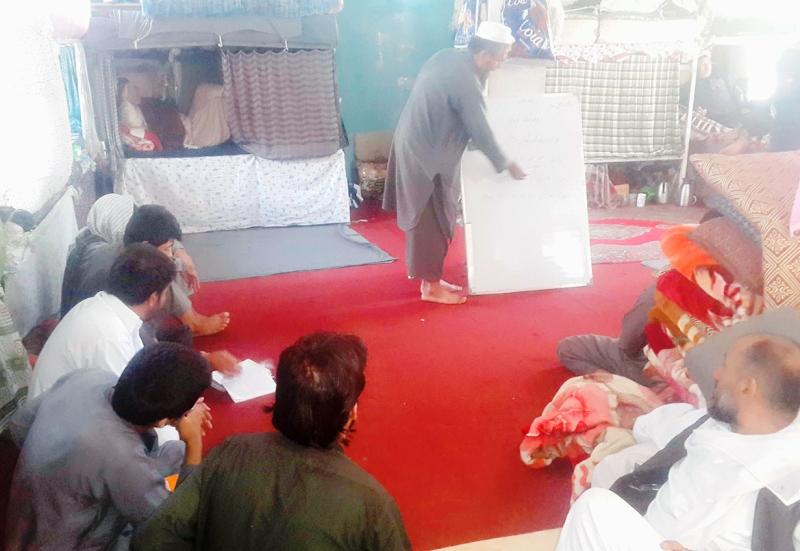CHARIKAR (Pajhwok): “I can now read and write, so I am very happy. I wish I had been jailed a few years ago, so I could be literate,” says a prisoner learning in the main prison of central Parwan province.
Abdul Lateef, 40, hails from the Tatmudra area of Charikar, the provincial capital. He was sentenced to five years in jail in the solar year 1394 on charges of conducting anti-government activities.
Two days before Eid-ul-Fitr, Lateef was sitting in a class room along with other prisoners, paying attention to his teacher. As the class ended, he told Pajhwok Afghan News he had been included in the literacy programme about nine months back.
Lateef, who no longer feels to be a prisoner, said: “In the past, I couldn’t read. I would wish I could. But now with the grace of God, I can read and write. I spend my time reading and writing inside jail.
“At times, I wish I had been jailed several years ago so I could be literate.” Lateef acknowledged they had learnt many things from teachers, including how to pray, fast and comply with other religious orders. Therefore, all prisoners attending the programme are happy.”
Naseer Ahmad, 24, a resident of the Qala-i-Sahra area of Jabalus Siraj district, has been on in the literacy programme for four months. He has been in jail for one year on the charge of killing his cousin
Ahmad’s case has not been finalised yet and his prison term is yet to be determined. He said: “About four months back, I couldn’t read, but now I can read and also can write a little bit. I am trying to learn more.”
Rasool Dad, hailing from Dara-i-Sorkh area of Sorkh Parsa distirct had been jailed for six years for being accomplice to murder of his cousin. The 50-year-old has so far served five years of his term. He has learnt literacy skills and religious education.
One of the most intelligent prisoners, he is happy with the literacy programme. However, he complained about the shortage of stationery, books and a specified class room.
The inmates are currently taught in a cell housing 34 prisoners. The activity thus amounts to disturbing the literate prisoners who do not need to attend the class. He asked officials of the Literacy Department to take steps to resolve these issues
Pajhwok tried to speak with female attendees of the literacy programme. but the prison administration did not allow any contact with them.
Dilawar, one of the teachers at the prison, said teaching standards for men and women.
He said the prisoners were convinced if they had literacy and knowledge, they would not have committed the crimes they did. “I hope once the prisoners are released, they wouldn’t any crime.”
Based on information from Abdul Wakeel Qudsi, the Education Department’s literacy director, over the past five years, 500 prisoners, including men and women, had attended the literacy programme in prison.
The initiative has resulted in a positive change in the behaviour of prisoners, who read a variety of books for learning writing and reading.
He admitted the prisoners were faced with issues in terms of a shortage of books, stationery and lack of a class rooms, saying efforts were being made to resolve the problems.
According to him, prisoners were continually admitted to the literacy programme every nine months, taught by two teachers. The graduates are considered third-grade students.
The officials said the prisoners, after being graduating from the literacy programme received certificates of third class. They could continue studies in literacy schools or government schools after being freed.
Currently, 450 people including 30 women are held in the prison on various charges.
sns/mud







GET IN TOUCH
NEWSLETTER
SUGGEST A STORY
PAJHWOK MOBILE APP